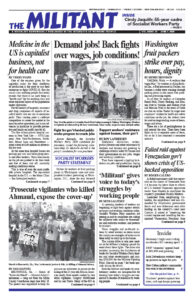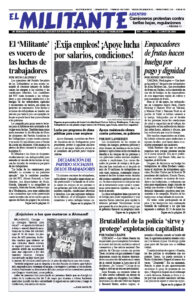Workplace skirmishes, strikes, public protests and other resistance by workers and farmers are growing to challenge attacks today by bosses and their government on our jobs, wages and working conditions.
They have imposed crippling lockdowns on jobs and production, laying off over 30 million workers in just a matter of weeks, sharply accelerating the decadeslong decline of their crisis-wracked capitalist system. Their only answer is to force more of the devastating social and economic burden onto our backs, in the U.S. and worldwide.
The working class has to be at work to organize and use our collective strength to push back the bosses’ offensive. We need to fight to end all the layoffs and demand the government pay for a massive public works program to provide jobs for those who don’t have them at union-scale wages to build things working people need. Otherwise, stuck at home, we cease being a class.
Strike struggles are taking place by fruit packing factory workers in Washington’s Yakima Valley, by sanitation workers in New Orleans, copper miners facing union busting by Asarco in Arizona and Texas, and elsewhere. Independent truckers have parked their rigs along Constitution Avenue in Washington, D.C., demanding an end to unlivable rates imposed by brokers and red tape by the federal government.
The big majority of the 162 workers at Johnson Controls commercial HVAC assembly plant in Albany, Missouri, walked out May 19. The key issue is forced overtime and workers being fired for taking time off. Workers are forced to work six days a week, 10 hours a day.
“The workers are looking for some relief on flexible hours so they can start working to make a living instead of living to work,” Greg Chastain, business manager of Sheet Metal Workers Local 2, told the media.
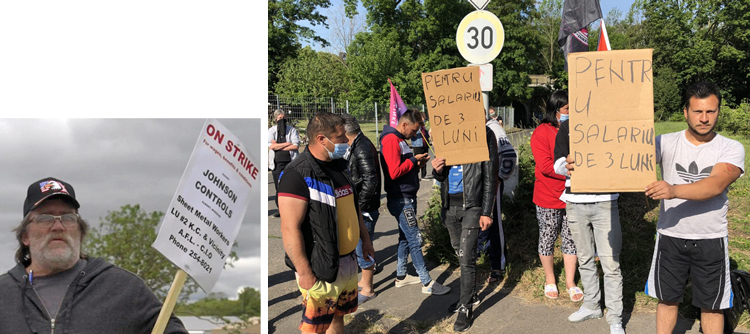
The workers also say they face stagnant wages and deteriorating working conditions. Johnson Controls is a sizable international conglomerate, with over 100,000 employees worldwide. So far the bosses have refused further negotiations and are trying to keep the plant running using management.
All these fights deserve active solidarity from working people.
Bosses from the Big Three auto barons to department store owners and restaurants increasingly want to see production running. Without it many fear being driven into bankruptcy — like J.C. Penney has been — or losing ground to rivals abroad.
They hope to crush their competitors — both other companies and rival capitalist powers — in conflicts over markets and profits. This is pulling apart the European Union and sharpening tensions between Washington and Beijing. In the years ahead, as the illusion of a peaceful “globalized” world is torn apart by increasing national antagonisms, more financial crises and trade and currency conflicts will shake the globe, threatening new wars.
Federal Reserve Chair Jerome Powell admitted May 18 that unemployment could reach 25%, a figure comparable to that in the 1930s. These official government figures mask the real scale of joblessness, by not counting temps, self-employed, undocumented immigrant workers or those who work off the books. The U.S. economy could shrink by as much as a third in the second quarter of this year. As many job losses become permanent, capitalist investors’ expectations of a rapid “recovery” are receding.
Manufacturing output in the U.S. fell 13.7% in April, the steepest monthly drop in over a century. Retail sales — purchases at stores and restaurants — fell even more, by 16.4%. The number of coal mining jobs fell 12% nationwide in the last month to 43,800, accelerating a crisis for workers in many parts of Wyoming and Appalachia.
Worst-paid workers hit hardest
According to a Federal Reserve survey, the worst-paid workers are hit hardest by the lockdowns, with nearly 40% of those earning below $40,000 losing their jobs and many more having their hours reduced.
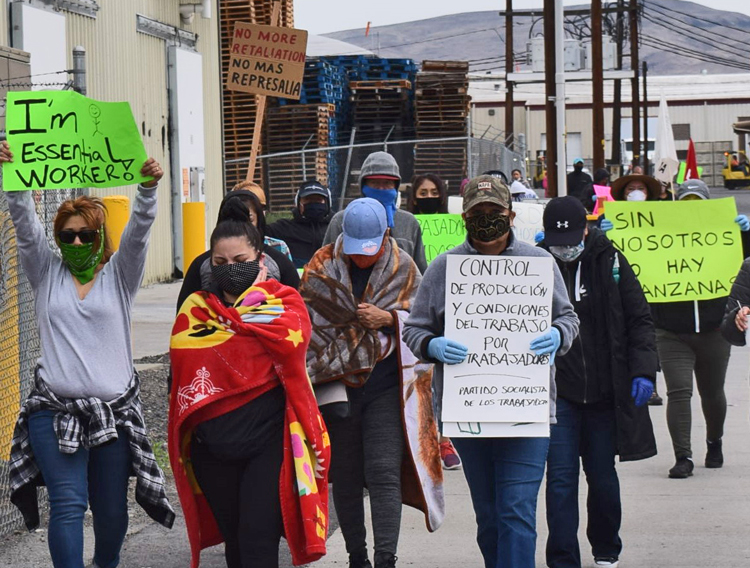
The meritocratic upper-middle classes, on the other hand, are the most vocal advocates of still tighter policing of arbitrary government social isolation edicts, including preventing workers from getting back to work. They look down on workers as a dangerous class that carries diseases, ignoring the fact that without the working class they’ll have nothing to eat. The fact is, the working class is the only “essential” class.
The bosses, their media and their politicians push the false idea that “we are all in this together,” a part of their pandemic scare campaign. There is no such “we,” there are two sharply counterposed social classes — millions of workers and fellow exploited producers on the one side and a relative handful of bosses, bankers and their hangers-on on the other. They fear above all that as more and more toilers recognize this truth, they will fight to defend their interests and through those struggles recognize their own self-worth and historic responsibilities.
The crisis conditions are having a politicizing effect on working people, who increasingly are looking for an explanation for the social and economic catastrophe we face and a road forward.
In this capitalist crisis, working people face intensified exploitation of our labor, whether as wage slaves or debt slaves, yet it is this social labor that sustains the entire edifice of production, distribution and culture. It is the solidarity built by struggles of the working class and its exploited allies on the land that will provide the only possible solution to this historic crisis. 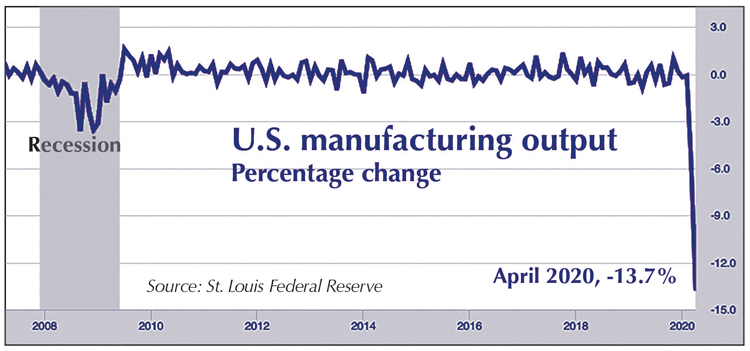
The Detroit automakers and supply companies from Canada to Mexico slowly restarted assembly lines May 18 after a two-month shutdown.
Some 11,000 workers at Tesla’s Fremont, California, plant, which makes electric cars, were recalled May 13. In April, those furloughed had their pay cut by 10%. Those laid off were told by the company that if they didn’t return to work immediately, they would risk losing their unemployment income. At the same time, Elon Musk, the billionaire owner of Tesla, took a $700 million payout.
Airline bosses calculate it will be awhile before people will start flying again, after the industry has been hard hit with a 90% collapse in air travel. Their plan is to drastically cut jobs.
An internal memo from Delta Air Lines said it is overstaffed by 7,000 pilots, half of its flight crew. United Airlines executives say they will only need 3,000 of 25,000 flight attendants in June. The big outfits that build planes, like Boeing and Airbus, have similar plans.
Crisis faces workers worldwide
The deepening crisis is taking a greater toll worldwide, from imperialist competitors in Europe and Japan to semicolonial countries. The U.N.’s International Labor Organization predicts that 1.6 billion street vendors and other so-called informal economy workers, especially in semicolonial countries, will suffer “massive damage” to their livelihoods.
Asparagus harvest workers have been protesting against abuse by the bosses in Bornheim, Germany. Garment workers in Bangladesh took to the streets to protest plant closings and the bosses’ refusal to pay back wages. Street vendors in the Kurdistan region of Iraq rallied to demand an end to government orders to shut down their shops.
Workers in Panama, Chile, Colombia and El Salvador have organized protests demanding jobs, lifting of government restrictions and aid for those blocked from working. Idled construction workers in Lagos, Nigeria, marched to demand they get back to work building an oil refinery in the Lekki Free Trade Zone.
This is just a beginning. From today’s resistance by workers and our allies will emerge the only solution to capitalism’s growing devastation.
